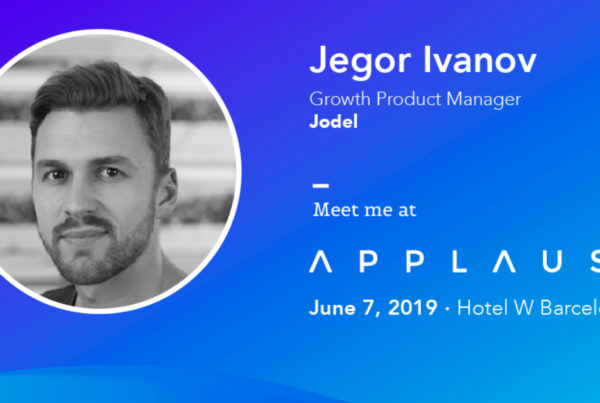Interview with Danika Wilkinson from Genera Games
Danika is currently the user acquisition manager at one of Spain’s top mobile gaming companies, Genera Games, the developer behind titles such as Frozen Free Fall, Star Wars: Puzzle Droids and Gladiator Heroes. As part of her role, she oversees both ongoing user acquisition campaigns, periodic launches and prototype testing over a number of games – from mid-core to hyper-casual. She’s interested in new UA strategies and channels, predictive data modeling for effective acquisition, and tying in ASO, PR and social media to be able to increase game visibility and improve user quality.
Get to know more about her!
 Quick Quiz Danika Wilkinson – Genera Games
Quick Quiz Danika Wilkinson – Genera Games
Danika will join us on Friday 7th of June at the W Barcelona Hotel. Do not miss the chance to learn from her!
1. How and when did you arrive in the mobile industry? Why did you decide to stay and work on this sector?
I arrived in the mobile industry just under three years ago almost by accident. Before coming to Spain I was pursuing a career in sports journalism in Sydney, Australia. I came here to teach English ‘for a bit’ and realized I wasn’t really cut out for it, and ended up in an office job in education management. About a year and a half later an opportunity came up at Genera Games and, despite not really knowing much about mobile gaming, I was lucky enough to get the job. From there I had a baptism by fire-style immersion into the industry, where I straight away started working on some huge launches: Gladiator Heroes, Shrek Sugar Fever and Barbie Sparkle Blast. I quickly realized that this was the industry I wanted to stay in because there is so much freedom to innovate and beat your own path. I’m a creative person but I also like order and routine; which I think is something that perfectly encapsulates user acquisition!
2. What project are you working on now?
Right now I’m working on Gladiator Heroes, our mid-core, strategy game that’s been live for just over two years. I’m also working on a new, cooking-style casual game, which (at the time of writing) is set to be released at the end of May. At a company level, I’m spending a lot of time with our DevOps and Analytics departments, trying to improve confidence and accessibility in data reporting and prediction for current and future titles. I was also recently involved in our submission to Great Place to Work, where we were named as one of the best workplaces in Spain and won a special ‘better for people’ award. I also work in internal communications and am responsible for organizing monthly, technical-based talks by colleagues, for colleagues.
3. What is the most important professional quality an app marketer can have?
Proactivity. The thing about this industry is that it’s still in its infancy and is constantly changing every day; what worked for you last week might not work today, and the path hasn’t been laid out for us like in other marketing sectors. Rather than reacting every time there’s a change caused by one of the stores or an ad network, I try to always have plans in place for the next test or strategy. To do this, I set aside time every week for research into new trends and ideas, and to see what my competitors are doing in both user acquisition and ASO. I also recommend joining online app marketer communities, such as the ASO Stack Slack, full of like-minded professionals whose experiments and ideas help you stay ahead of the curve.
4. What KPIs do you control every day? Which ones are the most important?
For us, the most important KPIs centre around revenue: ARPDAU, ARPU, ARPPU and LTV. At the moment we’re beginning to shift away from superficial metrics such as CPI and CTR; something which reflects a similar change across the industry. While it can feel like an uphill battle, it’s all about convincing other stakeholders to look at the long-term metrics, such as our LTV curve, to measure success.
5. What problem do you face in your every day as an app marketer?
One of the biggest problems at the moment is confidence in data. Different analytics platforms have different ways of validating user purchase data and quite often fraudulent or ‘pirate’ users can fall through the net and affect reporting, which may even lead to erroneous decisions. Over the past year or so, our DevOps teams have worked in an in-house solution to validate purchase data through a number of different systems to make it as trustworthy as possible, but past issues can often create mistrust in data and data predictions among stakeholders. It can also be very time-consuming to have to check and double-check that your data is correct across all reporting platforms, and that it’s passing through all the correct processes and being sent where it needs to go. Sometimes I can feel like I work in quality assurance rather than user acquisition!
6. What is the best option to monetize a mobile app?
I’ve only worked in mobile games, and in my experience, 80% or more of our revenue has come from IAPs. We always see a big fluctuation in revenue every time there’s a special or seasonal LiveOps event that includes special offers. Mostly all our games have rewarded videos, but we’re about to start testing Google Rewarded Products in one of our new games to see if we can increase ARPDAU among non-paying users while increasing ARPPU among payers and improving their user experience.
7. What advice would you give to a company or startup before launching a mobile app?
It’s never too early to start testing your monetization metrics and have some strict ‘kill metrics’ in place before starting out. Whether you’re monetizing with ads, IAPs or both, you need to be sure that you can acquire users at a below-LTV cost. If you can’t, you shouldn’t go ahead with the launch. Don’t think you’ll be able to depend on just organic users either: there’s so much competition on the stores these days that an organic-only strategy won’t work (unless you’re a well-established developer with lots of cross-promo options!).
8. What are the biggest challenges facing the mobile app industry?
There are so many answers to this question and it really depends on your product and acquisition/monetization strategy. I think in gaming the rising competition and costs mean that we’re constantly being challenged in monetization. It’s a constant battle to meet that positive RoAS goal in an overly-saturated market, where it’s harder and harder to keep a users’ attention span long enough to make a purchase.
There was also an interesting discussion floating around the app marketer community a month or so ago about click and view-through attribution and how there’s no standard definition of these across MMPs and different ad networks (see this article). On that same note, we’re also facing difficulties in incrementality and cannibalization: how to detect and measure them, and what they mean for app marketing.
9. What trends will mark 2019?
In user acquisition, we’re seeing a change in mindset from paying for ‘users’ to paying for ‘data’, and valuing how much it’s worth to us in the long-term. Take programmatic mobile marketing for example; many of these networks require a 6 – 8 week period to collect enough data to actually be able to start optimizing towards your objectives. The same methodology should be applied to app launches – we should start seeing early user acquisition as a data-collection exercise, which is going to help us optimize in the long run, and not as a way to make a quick return. It’s for this reason that it’s super important to have all your data validation and reporting tools in place from day dot so that you can trust your data and make the correct decisions.
10. How do you keep up to date with all the news in the app marketing industry? What sources do you consult?
As I mentioned earlier, the ASO Stack Slack is a great resource as it’s full of app marketers who are always sharing their ideas or interesting articles from around the web. I also subscribe to the marketing and gaming tags on Medium, and Appsflyer’s MAMA boards are also a great resource.
11. To finish, what apps or games have surprised you in the last year?
Coin Master by Moon Active is a really interesting case of how casino-style mechanics have crossed over into social gaming. Basically, the premise of the game is to spin a slot machine to be able to attack your friends’ villages or strengthen your own. If you look back over their version history you’ll notice that a seasonal event update coincides with an increase in store rankings, revenue and installs. At the time of writing it’s in the top 40 grossing in the overall US charts and in the top 5 for downloads in adventure games.



